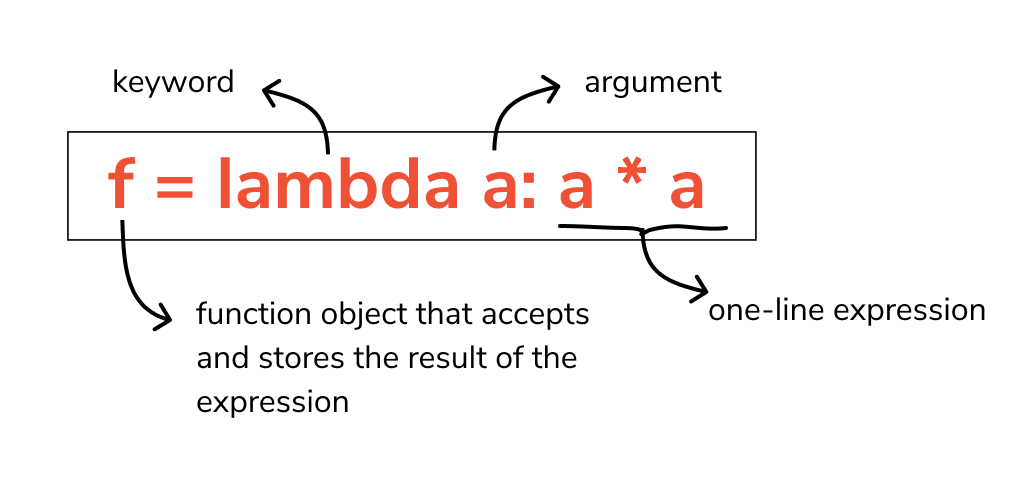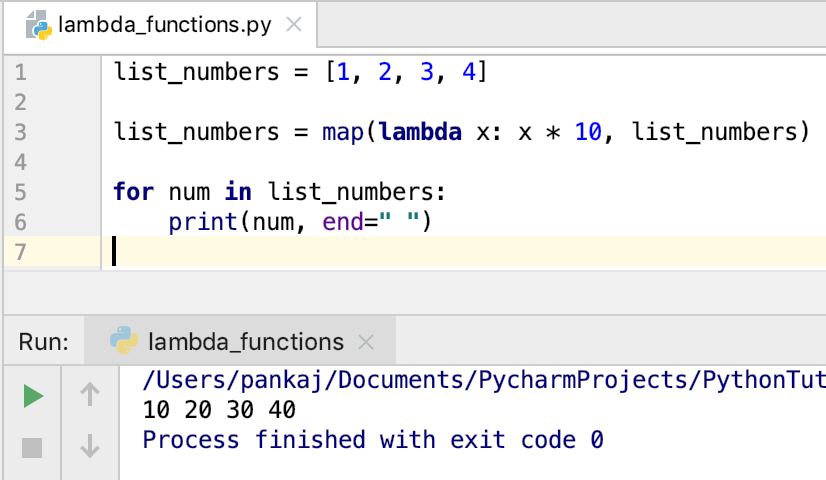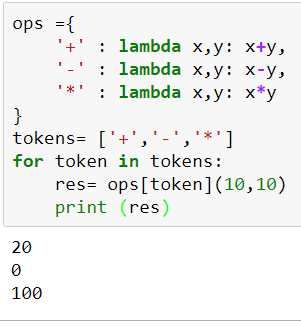
A lambda function is a small anonymous function. A lambda function can take any number of arguments, but can only have one expression.
- Introduction to Lambda functions in python
- Anonymous Functions in Python
- How to use Lambda Functions in Python?
- Use of Lambda Functions in Python
- Why use Lambda Functions?
- Lambda Functions in filter()
- Lambda Functions in map()
- Lambda Functions in reduce()
- Conclusion
- Python has many capabilities for enforcing purposeful programming concepts. When writing purposeful-fashion programs, you regularly want small capabilities that integrate elements. Python has a integrated manner to do that the use of lambda capabilities.
- In laptop programming, an nameless feature (consisting of a lambda expression) is a feature now no longer sure to an identifier. Lambda capabilities are an essential a part of purposeful programming that will let you write throw-away capabilities while not having to call them.
Introduction to Lambda functions in python :-

- In Python, an nameless feature can be a feature that’s described with out a reputation.
- While defining everyday features, we’re the usage of the def key-word in Python, however whilst defining nameless features we’re the usage of the lambda key-word.
- Hence, nameless features are also known as Lambda features.
Anonymous Functions in Python :-

- lambda arguments: expression
- Note that the Lambda capabilities will have any range of arguments however they’ve most effective one expression. Firtsly, the expression is evaluated after which returned. We used Lambda capabilities anywhere characteristic gadgets are required.
How to use Lambda Functions in Python?
A lambda characteristic in python has the following syntax.Syntax of Lambda Function in Python:-
- We use lambda features as soon as we require a anonymous feature for a quick duration of your time.
- In Python, we normally use Lambda Functions as a controversy to a higher-order feature (a feature that takes in different features as arguments).
- For Example, These are used collectively with integrated features like filter(), map(), and reduce(), etc, which we are able to speak later on this article.
Use of Lambda Functions in Python :-
Why use Lambda Functions?
1. As you can see withinside the preceding section, lambdas are handled identically to everyday features on the interpreter level. In a way, you’ll say that lambdas offer compact syntax for writing features that go back one expression.
2. However, you have to understand while it’s a first rate concept to apply lambdas and while to keep away from them. During this section, you can examine some of the appearance concepts used by python builders while writing lambdas.
3. One of the most not unusualplace use instances for lambdas is in practical programming as Python helps a paradigm (or style) of programming called practical programming.
4. It lets in you to deliver a feature as a parameter to a unique feature (for example, in map, filter, etc.). In such instances, the usage of lambdas provide a chic way to developing a one-time feature and byskip it because the parameter.
- A feature that defines the filtering constraint.
- A collection (any iterator like lists, tuples, etc.)
Lambda Functions in filter() :-
The clean out out feature is employed to pick out some precise elements from a series of elements. The collection used in this feature is an iterator which encompass lists, sets, tuples, etc. The elements which can be determined on are predicated on some pre-defined constraint. It takes 2 parameters:-

- A characteristic that defines how the operations to be achieved at the elements.
- One or greater sequences.
Lambda Functions in map() :-
The map characteristic is hired to apply a selected operation for every detail in a sequence. Like filter(), it additionally takes 2 parameters:
- Step-1: Perform the described operation at the number one 2 factors of the sequence.
- Step-2: Save this end result.
- Step-3: Perform the operation with the stored end result and consequently the subsequent detail in the sequence.
- Step-4: Repeat till no extra factors are left.
- A feature that defines how the operations to be performed.
- A sequence (any iterator like lists, tuples, etc.)
Lambda Functions in reduce() :-
The lessen feature, like map(), is hired to apply an operation to every detail in a sequence. However, it’s running is a chunk differs from the map feature. The following steps are to be accompanied with the aid of using the lessen() feature to compute an output:-
It additionally takes parameters:
- Write Python lambdas and use nameless features.
- Choose accurately among lambdas or everyday Python features.
- Avoid immoderate use of lambdas.
- Use lambdas with higher-order features or Python key features.
Conclusion :-
You now recognise a way to use Python lambda features and can:-





